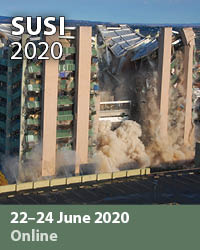22–24 June 2020
Online
Introduction
SUSI 2020 is the 16th International Conference in the successful series of Structures Under Shock and Impact. The first conference started in Cambridge, Massachusetts, (1989) and continued in Portsmouth, UK (1992); Madrid, Spain (1994); Udine, Italy (1996); Thessaloniki, Greece (1998); Cambridge, UK (2000); Montreal (2002); Crete (2004); the New Forest, home to the Wessex Institute (2006); the Algarve, Portugal (2008); Tallinn, Estonia (2010), Kos, Greece (2012); The New Forest, UK (2014); Crete, Greece (2016) and Seville, Spain (2018).
The increasing need to protect civilian infrastructure and industrial facilities against unintentional loads arising from accidental impact and explosion events as well as terrorist attacks is reflected in the sustained interest in the SUSI meetings over three decades. While advances have been made over this period, many challenges remain, such as to develop more effective and efficient blast and impact mitigation approaches than those that currently exist. The primary focus remains the survivability of physical facilities and the protection of people, as well as reducing economic losses and impact on the environment, with emphasis on innovative protective technologies to support the needs of an economically growing, modern society. The application of this technology ranges from the safe transportation of people and dangerous materials to defences against natural hazards such as floods, wind, storms, tsunamis and earthquakes.
Large scale testing is prohibitive and small scale laboratory testing results in scaling uncertainties. Continuing research is therefore essential to improve knowledge on how these structures behave under a variety of load actions, some of which interact making it even more complex and difficult to define. Consequently, more use of advanced numerical simulations for load and structural response calculations is common practice in industry and research. Such calculations can directly be used in design and risk assessment calculations, but also be applied to more simplified design tools and design codes. Whether numerical or analytical modelling techniques are employed, experimental validation is vital for there to be acceptance of the approach to be used. The SUSI meeting over the years has fulfilled many objectives, not least to provide a forum for the exchange of research ideas and results to promote a better understanding of these critical issues relating to the testing behaviour, modelling and analyses of protective structures against blast and impact loading.
It is the objective of these meetings to bring together scientists and engineers from a wide range of academic disciplines and industrial backgrounds who have an interest in the structural impact and blast response of structures and materials. In this way, the major developments in different areas can be brought to the attention of the entire community.
All papers presented at the SUSI conference since 1994 are archived in the WIT eLibrary (www.witpress.com/elibrary), where they are accessible to the international community.
Topics
The following list covers some of the topics to be presented at the Conference. Papers on other subjects related to the objectives of the meeting are also welcome
- Impact and blast loading
- Energy absorbing issues
- Computational and experimental results
- Response of reinforced concrete under impact
- Response of buildings to blast
- Seismic behaviour
- Protection of existing structures
- Industrial accidents and explosions
- Hazard mitigation and assessment
- Security issues
- Response of composite structures to blast and impact
- Vehicle impact
- Ballistics analysis
- Dynamic material behaviour
- Structural design against multiple based activities
- Fluid-structure interaction
- Multiphysics coupled problems
- Case studies
